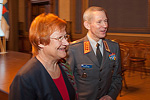The President of the Republic of Finland: Press Releases and News
News, 1/25/2010
President Halonen: Broad cooperation ensures security

Presidentti Halonen opened the 192nd National Defence Course. Copyright © Office of the President of the Republic of Finland
According to President Halonen, our concept of security and threats to it has changed considerably in the past two decades. Security has been more clearly understood as a broad whole, the President said in her opening speech of the 192nd National Defence Course at the House of the Estates on Monday 25, November 2010.
In addition to armed conflicts, threats to broad security include extreme poverty, terrorism, contagious diseases and natural disasters. “International cooperation has become a regular part of responding to these threats - as in the Southeast Asian tsunami five years ago or the earthquake in Haiti two weeks back.”
Finland is still a secure country, President Halonen said. “Nevertheless, we must constantly take care of our security, considering changes in our own country as well as global development. Security affects us all, and ensuring it requires broad cooperation. For this reason it is key to have as broad a consensus as possible concerning the development of Finnish security.”
Alongside the development of military service, consideration should be given to the development of alternative service. “When the report was being prepared I thought it was important that alongside the development of military service, consideration should be given to the development of alternative service.”
The key forum is the G-192
 Commander-in-Chief of the Defence Forces, President Tarja Halonen and Commander of the Finnish Defence Forces General Ari Puheloinen. Copyright © Office of the President of the Republic of Finland
Commander-in-Chief of the Defence Forces, President Tarja Halonen and Commander of the Finnish Defence Forces General Ari Puheloinen. Copyright © Office of the President of the Republic of FinlandWith crises becoming more multi-dimensional, attention must also be paid to our peacekeepers' training, the President said. Soldiers have to participate not only in preventing hostilities but also in supporting crisis societies' own security and protecting civilians. “I myself have thought - sometimes out loud - that we should evaluate our own expertise more thoroughly before we send our troops to crisis areas. We must have a clear idea about what tasks Finnish soldiers are best suited to perform.”
Afghanistan is a timely example of international cooperation and Finland's efforts to approach a crisis in a comprehensive way. We do not want simply to increase the number of soldiers but also to strengthen civilian and development aid to the country. I am sure that our success in this will also be discussed by you during this course.
According to President Halonen, the reference groups in multilateral activity are being reshaped. The G-8 group of eight leading industrialized countries has already been replaced in practice by the larger Group of Twenty (G-20), which includes the leading developing countries as well. “Nevertheless, the most important G is the G-192, which means that the key forum for multilateral cooperation must remain the United Nations. Its Security Council has primary responsibility in international peace and security issues.”
Photos
 |  |  |
 |  |  |
 |
About this site webmaster[at]tpk.fi



